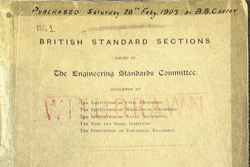 Standards are reviewed every five years. If they are not considered relevant in the current market, they are withdrawn. This means they are not considered current and don’t have standard status.
Standards are reviewed every five years. If they are not considered relevant in the current market, they are withdrawn. This means they are not considered current and don’t have standard status.
But this doesn’t mean the withdrawn standard is worthless. In fact, you might be surprised how many types of people might want to use withdrawn standards, and how they do so.
1. Lawyers
Withdrawn standards are frequently used in litigation to support one party’s claim that they followed the standards that applied at the time. Some claims might rely on withdrawn standards dating back decades, so it’s important that these documents should be accessible.
2. Researchers
The historical technical information offered by withdrawn standards can be very interesting to researchers looking at how a particular area developed over time, or what impact a particular regulatory provision made.
3. Mechanics
If you’re called upon to manage machinery which was designed and built many years ago, it helps to have an insight into best practices that were applied at the time of creation. Knowing the standard procedures from times gone by can help save guesswork today, and get machines working again without costly delays.
4. Compliance investigators
Standards are sometimes referenced in legislation or contractual agreements. Using withdrawn standards can clarify past compliance requirements to address contractual disputes.
There are two ways to access withdrawn standards
The easiest way is to purchase the standard as a PDF. Many withdrawn standards are readily available in this format (select ‘withdrawn standards in the BSI Knowledge filter) or our research team will be happy to scan a withdrawn standard on request. BSI members are given an exclusive discount on BS documents.
Alternatively, you can turn to BSI’s hard-copy library for researchers. This archive maintains historical documents and catalogues, with the earliest standard dating back to 1903.
The hard copy standards are of historic interest in themselves, providing additional information about the development of printing practices and typography in the UK. Sometimes the hard copy has features that cannot be scanned and thus won’t be seen on a digital copy.
Prior to purchasing a withdrawn standard, a few points to consider:
- Withdrawn publications are not considered current standards and do not have the status of a standard.
- British Standards are published for voluntary use. Although they might support UK legislation and regulation, they have, in themselves, no regulatory status.
- The British Standards Institution (BSI) is not a government or regulatory body. The application of a standard is a contractual matter between the parties concerned unless mandated by national or European regulation.
- An installation made in accordance with a specific standard after the withdrawal date would not be made in accordance with a current British Standard, irrespective of when the design was undertaken.
- Design and installation are two separate matters, and you would need to consult all interested parties (client, insurance companies, etc.) as to what they consider acceptable.
If you have a need for or an interest in a withdrawn standard and want to purchase one, please contact our Customer Relations Team.
Remember, if you are a BSI Member, and have a question about a standard, the Knowledge Centre experts are ready with the answers.

 Standards are reviewed every five years. If they are not considered relevant in the current market, they are withdrawn. This means they are not considered current and don’t have standard status.
Standards are reviewed every five years. If they are not considered relevant in the current market, they are withdrawn. This means they are not considered current and don’t have standard status.